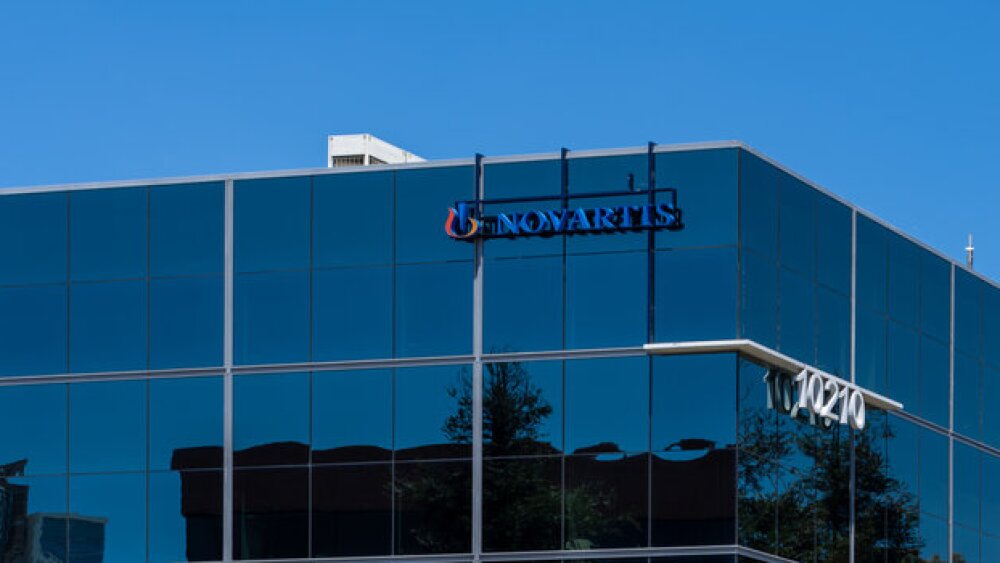The Swiss pharma has set up its challenge to AbbVie’s blockbuster immunosuppressive drug Humira with a label expansion for Cosentyx in hidradenitis suppurativa, a painful long-term skin condition.
Pictured: Novartis logo on building in California/iStock, JHVEPhoto
The FDA on Tuesday expanded the label of Novartis’ IL-17A inhibitor Cosentyx (secukinumab) to cover moderate to severe hidradenitis suppurativa in adults, a painful long-term skin condition.
Cosentyx is the first and only FDA-approved fully human biologic that directly targets IL-17A cytokine and is the first new biologic treatment option for hidradenitis suppurativa (HS) in almost a decade, according to Novartis’ announcement.
With Tuesday’s approval, Cosentyx will now come into competition with AbbVie’s blockbuster antibody Humira (adalimumab), which became the U.S.’s first FDA-approved HS therapy in September 2015.
Unlike Cosentyx, Humira targets TNF-alpha, another molecule involved in the pro-inflammatory cascade. This mechanism of action has also won Humira other indications, including rheumatoid arthritis, Crohn’s disease and plaque psoriasis.
Cosentyx, a human IgG1 monoclonal antibody, targets IL-17A to block its interaction with the counterpart receptor, thereby suppressing the pro-inflammatory signaling cascade. It was first approved in 2015 and is also indicated for the treatment of plaque psoriasis, psoriatic arthritis, ankylosing spondylitis, enthesitis-related arthritis and non-radiographic axial spondyloarthritis.
“HS is one of the most devastating and exhausting skin diseases,” Donna Atherton, founder and chief mission officer at the International Association of Hidradenitis Suppurativa Network, said in a statement.
The condition is chronic and systemic and is characterized by boil-like lumps that typically burst into open wounds, which often result in irreversible scarring. HS flare-ups can cause debilitating pain that disrupts work and social participation, as well as pose a heavy emotional and mental toll on patients.
Central to the disease’s pathology is the IL-17 pathway, which is dysregulated and overactivated in HS and gives rise to its inflammation-driven symptoms.
“The approval of a new treatment option brings fresh hope to me and the HS community that we may find relief from the burden of the disease,” Atherton said.
The FDA based its approval on data from the SUNSHINE and SUNRISE studies, the largest Phase III program in HS to date, according to Novartis’ news release. Together, these studies showed that Cosentyx-treated patients achieved significantly higher rates of clinical response compared to placebo. The IL-17A inhibitor demonstrated efficacy as early as week 2, progressively improved through week 16 and persisted until week 52.
SUNRISE and SUNSHINE also found a safety profile for Cosentyx that was consistent with what had been established in prior studies.
Also eyeing a portion of the HS market is UCB, which is advancing the dual IL-17A and IL-17F inhibitor bimekizumab. In March 2023, the company reported clinically meaningful, deep and persistent treatment response in the Phase III BE HEARD I and BE HEARD II studies. At the time, UCB was gearing up for global regulatory submissions for bimekizumab in this indication starting in the third quarter of 2023.
Bimekizumab won the FDA’s approval in October 2023 for plaque psoriasis, for which it is sold under the brand name Bimzelx.
Tristan Manalac is an independent science writer based in Metro Manila, Philippines. He can be reached at tristan@tristanmanalac.com or tristan.manalac@biospace.com.






